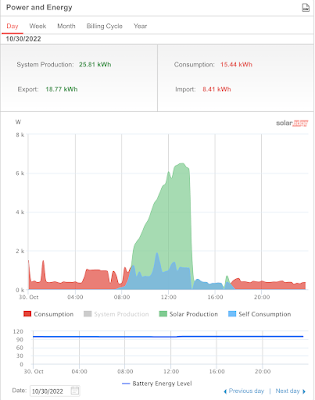The power has "blinked" a few times during the night in recent weeks. We notice when certain appliances in the bedroom light up after coming back on. It's annoying, but not so frequent as to rise to a serious problem. I thought this might be another instance of that. It wasn't.
At 2:21 PM our local utility Central Hudson Gas & Electric Corp. (CenHUD) texted to inform us that "We believe there is an outage" affecting our address. The message estimated that 608 customers were without power at that moment and that it was expected to be restored by 5:30 PM.
My daughter and I finished our lunch and drove home. My outdoor lights — both at the front porch and outside the garage doors — were lit. And inside, my wife was watching TV as if nothing were amiss. To her nothing was. Yet there was no indication from CenHUD that the power outage had been fixed.I opened up the SolarEdge monitoring app on my phone and saw the information displayed at the left. It showed that my solar panels were generating 330 watts of power, all of it flowing directly to my house. The TV was working normally as were the cable modem and Wi-Fi routers that supplied it with content. Lights came on normally in the bathrooms and the kitchen. Had I not received the text message from CenHUD, I might have been unaware there was a problem with the power grid at all.
As far as I could tell, all the power we were using at that moment was coming directly from the roof panels themselves, and nothing was coming from the battery. I explained all this to my wife, who was suddenly rather impressed. In the months before we signed the papers to install the panel-and-battery system I had made myself something of a pest on the subject of solar power. Now it was paying off. As the implications of the moment dawned on her, she slapped me a high five.
I settled into my office to watch an MLS Playoff game on my iPad. My daughter watched a movie in the family room. Life proceeded as normal.
While I was watching the game, I kept an eye on the SolarEdge app an outage map that CenHUD had provided.
But I started to wonder what might happen if the outage dragged on into the night. Saturday was a sunny day that started cold with temps below freezing but ended in the mid-60s. The sun was due to set just before 6 PM. If the outage were not resolved, we'd be running on battery power, something we've yet to experience.
Fortunately, we didn't have to find out what it's like on battery power. CenHUD corrected its outage on schedule and our connection resumed before sunset.
I went back into the monitoring app the next day and looked a little more closely at the data.
It's clear from the data that prior to the grid failure, the panels had been producing substantially more power than the house was consuming at the time. And in fact, had we upped our consumption, say to bake a cake, or had we wanted to turn on the air conditioning, we would have been fine to do so.
Since it was a sunny and clear day, at the moment of the grid failure, the panels had been generating 6.2 kWh worth of power, and through the inverter, exporting most of that externally to CenHUD. Our consumption at that moment was less than 1.2 kWh. What I think happened is that when the inverter temporarily lost its connection to the grid, it simply stopped sending out that excess power. Fortunately, we didn't have to find out what it's like on battery power. CenHUD corrected its outage on schedule and our connection resumed before sunset.
I went back into the monitoring app the next day and looked a little more closely at the data.
It's clear from the data that prior to the grid failure, the panels had been producing substantially more power than the house was consuming at the time. And in fact, had we upped our consumption, say to bake a cake, or had we wanted to turn on the air conditioning, we would have been fine to do so.
Obviously, we were lucky that this outage happened on a day with sunny conditions. Power grids fail during severe weather events all the time. Part of my calculus in adding the solar panels and the battery has been to hedge against these moments and improve our chances of easily lasting through these moments with an easy source of power plus battery backup. And I don't expect everything to work as it did on Sunday. I've been told that when running on all-battery power during the night, we'll want to be careful with our consumption, and avoid high-consuming activities. But as yet I've no experience against which to gauge that advice.
Meanwhile, I have an update on October's performance. For the entire month, we produced 811.87 kWh against total consumption of 515.48, leaving us with a production ratio of 1.58, which is both higher than I reported here on Oct. 19 and also higher than the level of 1.25 I recorded for the month of September. I had hoped to finish with that ratio above 1.6, and before some rainy days last week, it had indeed risen above that level, only to settle lower.
I exported 570 kWh or 70 percent of the total amount produced, and that added up to more than twice the 274 kWh I imported from CenHUD's grid. Overall I produced nearly half or 47 percent of the power I consumed and imported 53 percent. And despite Sunday's brief outage, usage of the battery remained at zero.
I still haven't seen a bill from CenHUD against which to compare these results, though one is expected any day now. That will be the subject of my next post.



